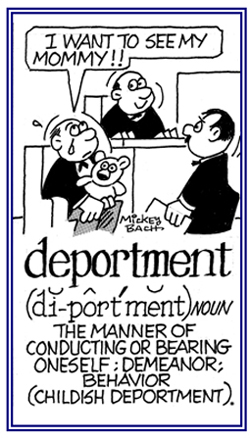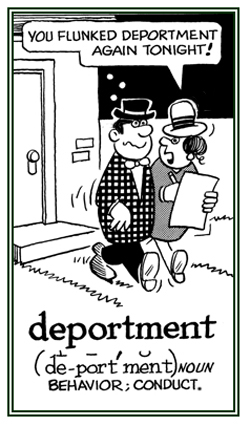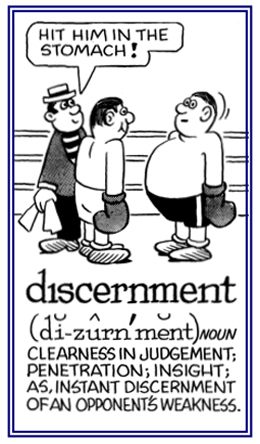-ment
(Latin: a suffix; result of, means of, act of; place of action)
The suffix -meant is a final word element derived through Middle English and French from the Latin suffix -ment(um), originally used to form agent and action nouns from verbs, now used to form nouns and denominative verbs in several related senses:
- "An action, process, or skill" denoted by the combining root: rearmament, tournament, management.
- "A result, object, or agent of an action" named by the joining root: entombment, enthrallment, agreement.
- "The means or instrument of an action": implement, medicament, reinforcement.
- "The place of an action" named by the first root: battlement, ambushment, settlement.
- "A state or condition" specified by the first root: bewilderment, predicament, bereavement.
The verb combinations show no change in basic form: cement, compliment, lament.
Principal parts: -menting, -mented, -mented.
Related forms: -mentum (singular); -menta, -menti, -ments (plurals).
The football team was told on several occasions that they were required to follow the rules of good deportment on and off the field.
As the manager of the store, in addition to being in charge of the administration of the products being sold, he or she is also responsible for the deportment of the employees who are serving the customers.


Go to this Word A Day Revisited Index
so you can see more of Mickey Bach's cartoons.
2. That which is bad or worse: The depravement of the administrators of the newspaper was revealed by Sam, one of its reporters.
2. The case of a debate or a discussion being sidetracked from the initial topic: While talking about general illnesses, Mary suddenly asked a question about the bus schedule which caused a derailment away from the topic of people's ailments.
2. Something that causes harm or injury: Not wearing a helmet when riding a bicycle can possibly result in detriment to that person's head.
3. Etymology: from Latin detrimentum, from detri-, stem of detere, "to wear away"; from de-, "away" + terere, "to rub, to wear".
2. The act or process of devolving (passing responsibilities or rights to another); devolution.
2. An instance of, or an emotion of, being dejected, disillusioned, or dissatisfied: It was certainly a big disappointmen when Rose and her family didn't come to the reunion.
2. The act or process of perceiving something or exhibiting keen insight and good judgment: Gertrude was studying at the university so she could have a better discernment regarding the best vocational career to strive for.

Go to this Word A Day Revisited Index
so you can see more of Mickey Bach's cartoons.
2. Reproached, discredited and undervalued.
2. An object of law, such as an audio recording, movie, or a photograph, that can be used to furnish evidence or information.
3. Something; especially, a material substance as a coin bearing a revealing symbol or mark, that serves as proof or evidence.
4. In computer science, a computer file created with an application; such as, a word processor, a database, a spreadsheet, an illustration, or a text file.
2. Movies or television programs which relate the facts about actual people and events: "They watched the series of documentaries about the royal families of europe."


